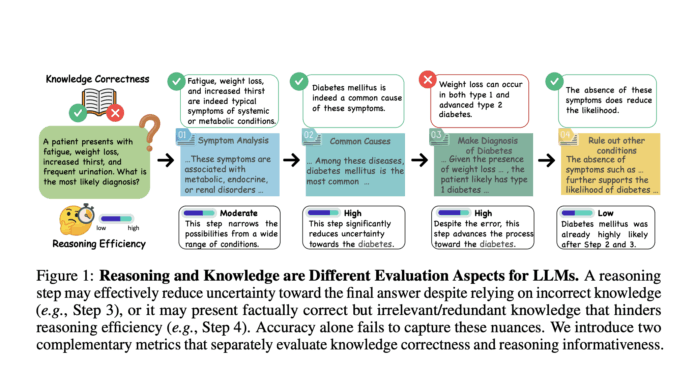Unpacking Reasoning in Modern LLMs: Why Final Answers Aren’t Enough
Recent advancements in reasoning-focused LLMs like OpenAI’s o1/3 and DeepSeek-R1 have led to notable improvements on complex tasks. However, the step-by-step reasoning behind these models remains unclear. Most evaluations focus on final-answer accuracy, which hides the reasoning process and doesn’t reveal how models combine knowledge and logic. Some earlier methods attempt to measure reasoning by comparing answers to the original question, but this approach is flawed since models often rely on prior deductions or internal knowledge. Domains such as math and medicine differ in their reasoning needs, highlighting the importance of developing better, domain-aware evaluation methods for building trustworthy AI.
The Shortcomings of Final-Answer Evaluations in Math and Medicine
Recent LLMs have made impressive strides in reasoning tasks, especially in math and medicine, thanks to better training data and reward strategies. However, most of this progress focuses on boosting final answer accuracy rather than understanding how the model reasons step-by-step. Past work has flagged factual errors in reasoning chains or measured similarity between reasoning steps and the original question. But such similarity doesn’t guarantee logical soundness or factual correctness, since LLMs often draw on internal knowledge or earlier reasoning.
A New Framework for Separating Knowledge and Logic in LLM Reasoning
Researchers from UC Santa Cruz, Stanford, and Tongji University go beyond final-answer evaluation by breaking down LLM reasoning into two key parts: factual knowledge and logical steps. They introduce a detailed framework that utilizes two metrics: the Knowledge Index (KI) for factual accuracy and Information Gain (InfoGain) for reasoning quality. Their analysis of Qwen models across math and medical tasks reveals that reasoning skills don’t easily transfer between domains. While supervised fine-tuning improves accuracy, it often harms reasoning depth. Reinforcement learning, however, helps refine reasoning by removing irrelevant information. This work highlights the importance of evaluating and training LLMs more thoughtfully.
Assessing Reasoning with Qwen2.5-7B and DeepSeek-R1 Models
The researchers evaluate reasoning in LLMs by analyzing Qwen2.5-7B and its DeepSeek-R1-distilled version, trained with SFT and RL. Using tasks from both math and medical domains, they decompose responses into logical steps and assess them using two key metrics: Information Gain (how much uncertainty is reduced with each reasoning step) and Knowledge Index (how factually accurate each step is, verified against expert sources). While InfoGain tracks the informativeness of each step, KI checks whether the knowledge aligns with real-world facts. This approach reveals how models reason and where they may falter in accuracy or logic.
Supervised Fine-Tuning vs. Reinforcement Learning in Domain-Specific Tasks
The study evaluates two variants of Qwen-2.5-7B—Qwen-Base and the distilled Qwen-R1 on medical tasks. Results show that Qwen-Base consistently outperforms Qwen-R1 in accuracy, knowledge retention, and reasoning, especially after SFT and RL. The distilled model likely struggles due to prior training focused on math and code, resulting in a domain mismatch. Interestingly, SFT enhances medical knowledge more effectively than RL, although it may slightly compromise reasoning efficiency. RL, on the other hand, improves both reasoning and knowledge when applied post-SFT. Medical benchmarks tend to rely more on factual knowledge than abstract reasoning, unlike math-focused tasks.
Conclusion: Toward More Interpretable and Trustworthy LLMs
In conclusion, the study introduces a framework that separates knowledge from reasoning to evaluate better how LLMs think, particularly in high-stakes areas like medicine and math. Using Qwen models trained with SFT and RL, the researchers found that while SFT improves factual accuracy, essential in medicine, it often weakens reasoning. RL, however, enhances reasoning by trimming out incorrect information. The framework could be extended to fields such as law or finance, where structured thinking is crucial. Overall, this approach helps clarify how LLMs make decisions and suggests ways to tailor their training for specific domains.
Check out the , and . All credit for this research goes to the researchers of this project. Also, feel free to follow us on and don’t forget to join our and Subscribe to .


